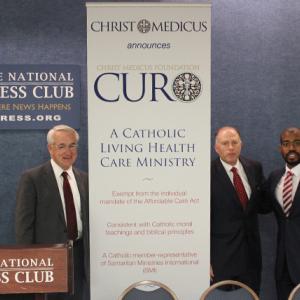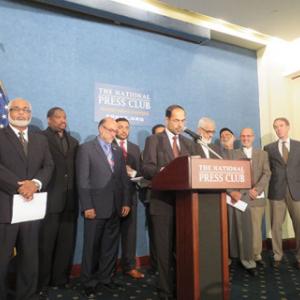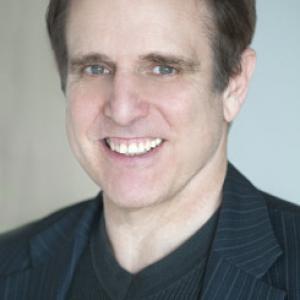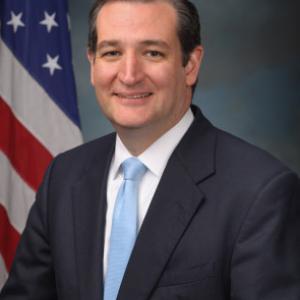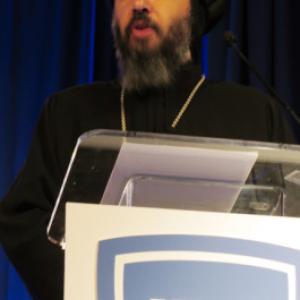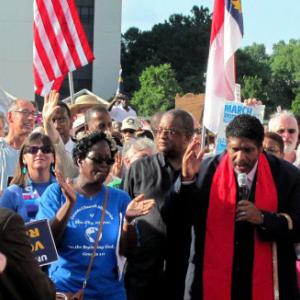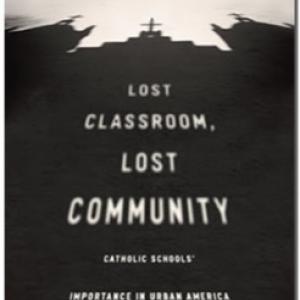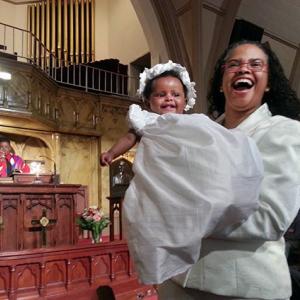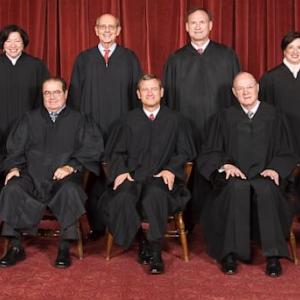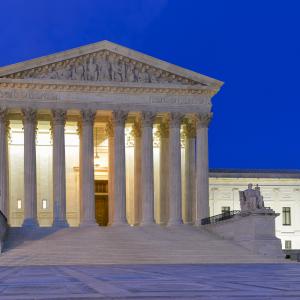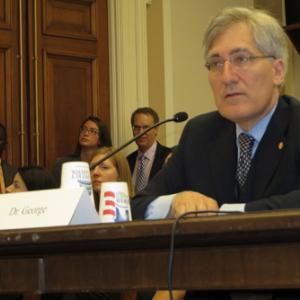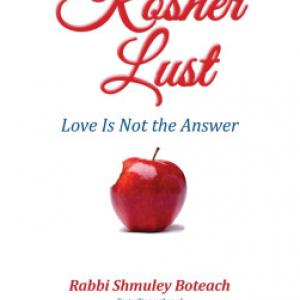Lauren Markoe covered government and features as a daily newspaper reporter for 15 years before joining the Religion News Service staff as a national correspondent in 2011.
Posts By This Author
Following Evangelicals, Traditional Catholics Create a Health Insurance Alternative
If you are a Christian who doesn’t smoke, abstains from sex outside your heterosexual marriage and can get your priest to vouch that you go to church at least three times a month, you may qualify for a new Catholic alternative to health insurance.
Taking a cue from evangelicals, a group of traditionalist Catholics on Oct. 2 unveiled a cost-sharing network that they say honors their values and ensures that they are not even indirectly supporting health care services such as abortion that contradict their beliefs.
Christ Medicus Foundation CURO, as the group is called, will be financially integrated with Samaritan Ministries International, which was launched in 1991 by an evangelical home-schooling dad. The SMI network now serves 125,000 people and is exempt from the Affordable Care Act.
“Think about the Gospels and how the Apostles lived,” said CMF CURO director Louis A. Brown Jr. at the program’s Washington, D.C., debut. “They very much shared and cared for each other. And we’re saying: ‘Catholics, you can do that too.’”
Muslim Inmate Takes His Case for a Beard to the Supreme Court
It’s not every day that a coalition of legal minds is rooting for a violent inmate convicted of stabbing his girlfriend in the neck.
When Gregory Holt’s case arrives at the U.S. Supreme Court on Oct. 7, lawyers won’t be arguing about what landed him a life sentence in an Arkansas state prison, but rather what he wanted to do once he got there: grow a beard in observance of his Muslim religious beliefs.
The state of Arkansas says he can’t. Holt — a convert to Islam who now calls himself Abdul Maalik Muhammad — says he would keep his beard no longer than half an inch. But prison officials, backed by the state’s attorney general, argue that even such a short beard poses security risks.
“When it comes to making prison policies, the stakes are high; lives can be lost if the wrong decision is made,” according to the state’s legal brief, which describes Holt as a violent self-declared fundamentalist. “The ADC takes religious freedom seriously, but it takes seriously its paramount interests in safety and security, too.”
The St. Louis-based 8th U.S. Circuit Court of Appeals agreed with Ray Hobbs, the director of the Arkansas Department of Correction. But it’s hard to find too many others who think that the prison’s case for security trumps Holt’s right to exercise his religion.
Muslim Scholars Tell Islamic State: You Don’t Understand Islam
More than 120 Muslim scholars from around the world joined an open letter to the “fighters and followers” of the Islamic State, denouncing them as un-Islamic by using the most Islamic of terms.
Relying heavily on the Quran, the 18-page letter released Sept. 24 picks apart the extremist ideology of the militants who have left a wake of brutal death and destruction in their bid to establish a transnational Islamic state in Iraq and Syria.
Even translated into English, the letter will still sound alien to most Americans, said Nihad Awad, executive director of the Council of American-Islamic Relations, who released it in Washington with 10 other American Muslim religious and civil rights leaders.
“The letter is written in Arabic. It is using heavy classical religious texts and classical religious scholars that ISIS has used to mobilize young people to join its forces,” said Awad, using one of the acronyms for the group. “This letter is not meant for a liberal audience.”
Even mainstream Muslims, he said, may find it difficult to understand.
Jewish Resolutions for the Jewish New Year
If you’re Jewish, it’s the time of year to do some serious soul-searching.
On Rosh Hashanah, the Jewish new year that begins at sundown on Sept. 24, Jews ask how they could have lived up to their better selves during the previous year, and for forgiveness from God and those they have wronged.
And while they’re not required to make New Year’s resolutions, a lot of Jews do anyway.
“Mine usually revolve around my mother,” said Debbie Sann, a Washington, D.C., mother of two. “I ask God to forgive me for not being a better daughter, and then I resolve to be a better daughter and I say I will call my mother at least once a week.”
Sann is typical of many Jews who make resolutions around Rosh Hashanah — nobody ever discussed the idea with her, or taught it to her in Hebrew school, but she started the practice because it just felt right. In her 20s, walking home from synagogue, she made her first resolution, and has been doing so ever since.
To some — and not always the most traditional of Jews — the practice seems a bit un-Jewish, a little too reminiscent of the quickly abandoned resolutions that spur couch potatoes to dig out their workout gear and join a gym in early January.
But like many Jews who make Rosh Hashanah resolutions, Sann also makes resolutions on Jan. 1. Those are different — she resolves to keep a more organized house, or to work harder. But the ones she makes during the Jewish High Holy Days “are about being a better person,” she said.
Ted Cruz Booed Off the Stage When He Touts Israel-Christian Solidarity
After he said “Christians have no greater ally than Israel,” Sen. Ted Cruz, R-Texas, was heckled off the stage at a Sept. 10 gala to raise awareness of beleaguered Mideast Christians.
Cruz, the keynote speaker at the Washington, D.C., dinner, sponsored by In Defense of Christians, a new organization spearheaded by Catholic and Orthodox Christians, prompted boos and cries of “stop it!” and “enough” and “no!” as an increasingly louder crowd told him to get off the stage.
The incident, first reported by the online news organization The Daily Caller, was captured on video by EWTN, the Catholic television network. The video shows that Cruz tried to continue speaking, but many in the audience, in a hotel ballroom, expressed anger when he included Hamas in the list of militants out to destroy religious minorities in the Middle East.
“In Defense of Christians” Seeks to Protect Brethren from Egypt to Iraq
Watching ancient Christian communities stand nearly defenseless as Islamic militants roll across swaths of the Middle East, coalitions of Christians are banding together to sound the alarm and demand government action.
The most recent effort is a three-day conference (Sept. 9-11) in Washington, D.C., which gathered Orthodox Christians, evangelicals, Roman Catholics and others for prayer, speeches and a lobbying push on Capitol Hill.
“If Christian voices are able to ring out as one from Egypt to Syria to Iraq, Lebanon and Jordan, then we really do believe it will be possible for Middle Eastern Christians to survive,” said Andrew Doran, executive director of In Defense of Christians, which organized the conference.
Doran, who describes himself as a Catholic with a great affinity for Orthodox Christianity, said the gathering has shown how Middle Eastern Christians can put aside their sometimes 1,500-year-old disagreements and take up the cause of their beleaguered brethren.
Religious Left Says It Won’t Drop the Moral Mantle in 2014
Faith leaders who sit to the left in American politics say they won’t let the religious right claim the moral mantle in the elections of 2014.
On Sept. 9, they announced a new campaign to boost voter registration and encourage voters, particularly in poor and immigrant communities, to go to the polls.
On a conference call to reporters, Ted Strickland of the Center for American Progress Action Fund, an ordained Methodist minister and former Democratic governor of Ohio, said he and others leaders will go door to door and church to church to press their message: that people of faith should pursue a public policy that is fair and just.
The Rev. William Barber, leader of North Carolina’s “Moral Monday” movement, which has long protested acts of the state’s conservative legislature, quoted Isaiah 10: “Woe to those who make unjust laws.”
Fallout in the Neighborhood When a Catholic School Closes
What happens to a community when a Roman Catholic school closes its doors?
That’s the question Nicole Stelle Garnett and Margaret F. Brinig, two Notre Dame law professors, pondered as they studied closures in Chicago, Philadelphia, and Los Angeles.
There were 7,000 Catholic schools in the U.S. in 2010, down from 13,000 in 1960, according to the National Catholic Education Association. The decline, rooted in the migration of parishioners to the suburbs and the secularization of Catholic culture, has been dubbed the “closure crisis” within the church.
Religion News Service asked Garnett about what she and Brinig found in their investigation, which resulted in their new book: Lost Classroom, Lost Community: Catholic Schools’ Importance in Urban America.
The interview has been edited for length and clarity.
Civil Rights Groups to Feds: Purge Your Anti-Muslim Training Materials
Civil rights and religious groups say efforts to rid federal agencies of anti-Muslim bias have faltered and prejudice against Muslims persists, particularly in the training of anti-terrorism officers.
On Thursday, 75 groups—including the Council on American-Islamic Relations, Auburn Seminary, and the NAACP—sent a letter to the White House urging an audit of federal law enforcement training material.
“The use of anti-Muslim trainers and materials is not only highly offensive, disparaging the faith of millions of Americans, but leads to biased policing that targets individuals and communities based on religion, not evidence of wrongdoing,” the letter reads.
A National Security Council representative said the letter will be reviewed and a response issued.
“As we said when these news reports first came to light, the use of racial or ethnic stereotypes, slurs or other similar language by employees is both unacceptable and inconsistent with the country’s core values,” said Caitlin Hayden, National Security Council spokeswoman.
The groups point to a reference to “Mohammed Raghead” in a memo and the claim by a former FBI official that the CIA’s director is a “closet Muslim.”
Bibles Booted from U.S. Navy Base Guest Rooms
The U.S. Navy will no longer allow Bibles and other religious materials in the guest rooms of Navy lodges, a decision that has infuriated some conservative groups, which recently learned about the new policy.
The Navy’s decision came after the Freedom From Religion Foundation sent a letter questioning the constitutionality of religious literature in the Navy lodges’ 3,000 guest rooms.
The June 19 directive from the Navy Exchange Service Command, which runs the Navy’s 39 guest lodges in the U.S. and abroad, allows religious materials to be made available to guests. But it forbids religious items to be placed in guest rooms, aligning the command, known as NEXCOM, with U.S. Navy policy, said NEXCOM spokeswoman Kathleen Martin.
On Tuesday the American Family Association made the directive the subject of its latest “action alert,” asking members to call Navy officials to reverse the decision. The Chaplains Alliance for Religious Liberty has called on the Navy to do the same.
But supporters of the Navy directive, said it rights a constitutional wrong, in that the Establishment Clause does not allow the U.S. government to promote or favor any particular religion.
Mommy, Minister, and Unmarried: Single Mothers in the Pulpit
When Philadelphia’s St. Paul Baptist Church hired the Rev. Leslie Callahan as its first female pastor, in 2009, she was nearing her 40th birthday and the tick-tock of her biological clock was getting hard to ignore.
She delighted in her ministry but also wanted a husband and children in her life. The husband she couldn’t do much about — he just hadn’t stepped into her life.
Now Callahan is mother to 22–month-old Bella, who was welcomed joyously by what the pastor describes as “a pretty traditional Baptist church.” She describes Bella’s arrival as “a divine regrouping,” a different answer to her prayers than the traditional mommy-daddy-baby model she had envisioned.
Ever since unmarried sitcom anchorwoman Murphy Brown shocked much of the country in 1991 by deciding to raise her baby on her own, the culture has changed. Once unthinkable and later unacceptable, single mothers by choice today are met with less judgment.
In fact, according to federal statistics, more than 40 percent of births are to unmarried mothers. But what if, like Callahan, the single mom by choice is a minister, or a rabbi?
Rabbi David Saperstein Tapped as First Non-Christian to Serve as U.S. Ambassador for Religious Freedom
President Obama on Monday said he plans to tap Rabbi David Saperstein as the next ambassador-at-large for international religious freedom, the first non-Christian to hold the job, which was created in 1998.
As ambassador, the man named as the most influential rabbi in America by Newsweek magazine in 2009, will head the State Department’s Office of International Religious Freedom, and will be tasked with monitoring religious freedom abuses around the world.
“When it comes to the work of protecting religious freedom, it is safe to say that David Saperstein represents the gold standard,” said Secretary of State John Kerry, announcing the nomination at the State Department.
A Reform rabbi and lawyer, Saperstein, 66, has led the Religious Action Center of Reform Judaism for 40 years, and has spent his career in Washington, focusing on social justice and religious freedom issues. He was instrumental in the 1993 passage of the Religious Freedom Restoration Act, which requires the government to show a compelling reason for any action that impinges upon the exercise of religion.
Faith Communities Are Dumping Their Fossil Fuel Investments
Worried about global warming, a growing number of churches and other faith groups are divesting their holdings in fossil fuel companies, which release large amounts of carbon dioxide and other greenhouse gases into the atmosphere.
“The warning in Scripture that ‘the wages of sin is death’ could not be more literally true than it is in the case of fossil fuels,” said Serene Jones, president of New York’s Union Theological Seminary, whose board voted in June to divest its $108.4 million endowment from fossil fuel companies.
“While we realize that our endowment alone will hardly cause the fossil fuel giants to miss even half a heartbeat, as a seminary dedicated to social justice we have a critical call to live out our values in the world. Climate change poses a catastrophic threat, and as stewards of God’s creation we simply must act.”
Presbyterians Remove Controversial 'Zionism Unsettled' from Denomination's Website

Zionism Unsettled cover page. Photo courtesy of www.israelpalestinemissionnetwork.org
The Presbyterian Church (USA) has removed from its website a booklet that many Jewish groups have criticized as hostile to Israel and denigrating to Judaism.
“Zionism Unsettled,” published in January by the church-chartered Israel/Palestine Mission Network, is a history and commentary on the Israeli-Palestinian conflict that paints Israel as the aggressor and describes Zionism as inherently racist and theologically flawed.
The booklet played a role last month in the denomination’s debate on divesting from three American companies that, divestment proponents say, profit from Israel’s occupation of the Palestinian territories.
Five Takeaways From the Hobby Lobby Case
Five things to know about one of the most anticipated Supreme Court decisions of the year:
1. Corporations can’t pray, but they do have religious rights.
Hobby Lobby isn’t a person. It’s a chain of crafts stores owned by a religious family. And though the evangelical Green family objects to parts of the Affordable Care Act’s emergency contraception mandate, it’s not the Greens but the company that writes the check for employees’ health insurance. The first question the justices had to answer was this: Does Hobby Lobby have religious rights? To many Americans, this sounds a little nutty. Does a craft store believe in God?
A majority of the justices held that a closely held company such as Hobby Lobby does have religious rights. The court didn’t apply those rights, however, to publicly held corporations, where owners’ religious beliefs would be hard to discern.
But well before the justices had delivered their verdict on this question, many legal scholars said they wouldn’t be surprised were they to affirm the company’s religious rights. American corporations do have some of the rights and responsibilities we usually associate with people. And in the 2010Citizens United campaign finance case, the justices overturned bans on corporate political spending as a violation of freedom of speech — corporations’ free speech.
What Does the Hobby Lobby Decision Mean?
The Supreme Court on Monday sided with the evangelical owners of Hobby Lobby Stores Inc., ruling 5-4 that the arts-and-crafts chain does not have to offer insurance for types of birth control that conflict with company owners’ religious beliefs.
Beyond the specifics of the Hobby Lobby case before them, the justices broke new legal ground by affirming that corporations, not just individual Americans or religious non-profits, may claim religious rights.
Does Monday’s decision mean, however, that the religious beliefs of business owners stand paramount? That they are more important than a female employee’s right to choose from the full array of birth control methods she is promised under the Affordable Care Act? Or that a business owner may invoke his religious rights to deny service to a gay couple?
Not necessarily, legal experts say.
Presbyterians Narrowly Vote to Divest from 3 Companies Involved in Israeli/Palestinian Conflict
The Presbyterian Church (USA) voted Friday to divest church funds from three American companies it cited for profiting from the oppression of Palestinians within Israel’s occupied territories.
The 310-303 vote of the church’s General Assembly in Detroit marks a victory for divestment supporters both within and without the 1.8 million-member PCUSA, now the largest American church to embrace divestment as a strategy to pressure Israel to return its illegally held lands.
The issue has roiled the church for the last decade, and during a more than three-hour debate, many lamented the divisiveness and noted how many around the world — in the U.S., Israel, and the Palestinian territories – would be watching.
Religious Rights Watchdog Pushes to Add Pakistan, Syria to List of Worst Offenders
One of the nation’s leading — and official — champions of religious freedom implored the Obama administration to add Pakistan and Syria to the list of nations that most egregiously violate religious rights.
Before a congressional subcommittee on Thursday Robert P. George, chairman of the U.S. Commission on International Religious Freedom, said it makes little sense that the roster compiled by the U.S. has barely changed in a decade.
The congressionally chartered commission George heads recently advocated that the State Department add eight nations to the eight already designated as “countries of particular concern.” But among the recommended additions, he singled out Pakistan and Syria for their deteriorating and troublesome records on religious liberty.
'Kosher Lust': Rabbi Shmuley Boteach Says It's More Important Than Love
Celebrity Rabbi Shmuley Boteach, spiritual counselor to Michael Jackson, onetime Republican candidate for Congress, and author of the best-selling “Kosher Sex” and “Kosher Jesus,” has a new book for Jews and non-Jews alike: “Kosher Lust.”
Its provocative subtitle: “Love Is Not the Answer.”
The answer, Boteach says, is lust, the God-given fuel for a healthy marriage. Love, he argues, cannot sustain marriage, but lust — what he calls the unfairly maligned member of the Seven Deadly Sins — can.
Survey: More Than One in Four Globally Infected with Anti-Semitism
The first ever global study of anti-Semitic attitudes shows that more than a quarter of the world’s population (26 percent) harbors anti-Semitic views.
The poll, released Tuesday by the Anti-Defamation League, also finds that a large proportion of the world has never heard of the Holocaust, or denies historical accounts of it.
Of those polled, 54 percent of those polled — and less than half of those under 35 years old — had heard of the Holocaust.
“For the first time we have a real sense of how pervasive and persistent anti-Semitism is today around the world,” said Abraham H. Foxman, national director of the Anti-Defamation League.
